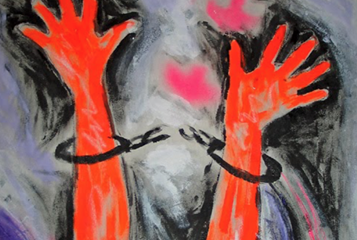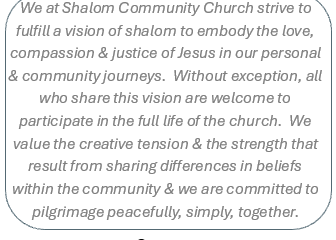Tent Pegs and Political Change
I want to take a moment, first, to revel in the beauty of a good revenge story. Here we have the King Jabin and his General Sisera. (This Jabin with a b, totally etimologically unrelated to our own Javan.) Together, Jabin and Sisera anchor an oppressive regime. Sisera directs 900 chariot-tanks, who has spent 20 years abusing and beating and, when he wishes to, killing the Israelites without cause, and it is so delicious to watch Jael—his ally’s wife—pick up her tent peg and put an end to Sisera’s cruel control. It is good to watch the unjust get their just desserts. Or, what feels like their just desserts.
But the punishing of the unjust is not always the same as the restoration of justice, we know that.
As Anabaptists, in a predominately pacifist community, we may feel a twinge of guilt when we cheer for Jael. What about creative nonviolence and peaceful protest and advocacy? What about all the times we’ve said “Violence is not the answer”?
But. We have not, fortunately or unfortunately, witnessed Jael in our midst, and we do not have to react to the death of Sisera in real time and face the ambivalence of this change in the political winds. Our own contemporary parallels of watching the mighty fall have, thus far, been peaceful and our self-righteous moral high ground spared.
This is not a sermon about pacifism and self-defense and the moral purity of nonviolence. This is a sermon about the moral function of revenge stories.
We can take Judges 4 as a story. A story of hope.
We are creatures who love stories because we know, in stories, not everything that is narratively true needs to be literally true. Stories are safe places where we can put our fantasies and trust that we can be more than the plot twists we enjoy. We can safely cheer the death of the villain because we have the protection of a story to shield the impact of death and violence on the other characters.
As your pastor, I want to tell you: it is okay if you like a good action film. It is okay to get sucked into a good mystery where the murderer is caught and punished. And it is okay for you, a baptized Mennonite and convicted pacifist, to comfort-watch Quentin Tarantino films. It’s okay to enjoy a good revenge story, precisely because it is a story.
There is a catharsis in that story, there is something in the hearing of a revenge story that can cue a set of chemical reactions that set our bodies into a kind of instinctive balance, affirming our sense that world is just and resetting ourselves so that we can go back out into the world feeling it is safe enough for us to move forward. And the tent peg, in its absurd detail, is one of the indicators that this is a safe story—it’s dark humor cues us to sit back and enjoy the story for the ways it allows us to release pain.
I don’t know why our brains work like that, but they do. It is a fine coping strategy to use the telling of these stories to make our way back to our emotional and physical baseline.
There is a release in watching Jael pick up the tent peg, knowing that every woman on this side of Mount Tabor has a reason to do so, and to watch Jael set these women free and get rid of the evil that has plagued them.
Sometimes, we need these stories of defeat in order to keep ourselves pointed toward hope.
The way that Martin Espada, in “Imagine the Angels of Bread,” describes squatters evicting their landlords and police officers burning their hands when they reach for their guns.
The way that Mary, in the Magnificat, describes God tearing the mighty from their thrones and the rich being turned away empty.
We need stories where the oppressors lose. Where, in clean and simple words, evil collapses, exhausted, and the people.
Some weeks ago in a sermon, I quoted G. K. Chesterton’s adage, “Fairy tales do not tell children the dragons exist. Children already know that dragons exist. Fairy tales tell children the dragons can be killed.”
It seems that adults, too, need fairy tales, and we need the reminder that dragons exist.
This story is not so much about Barak and Deborah and Jael and Sisera as it is about the people who need to hear this story repeated generations later.
Much of the Old Testament—and, really, the New Testament—was compiled when a group of faithful people were suffering needlessly and tempted toward hopelessness. The Bible is the collection of hope stories that economically exploited, ethnically abused, suffering people told to each other to keep their spirits up and to motivate each other on the long march for justice.
Judges, in particular, can discomfit Anabaptists because of its sudden, violent turns and the frequent justification of murder and, at times, genocide. And it’s not just Anabaptists that feel this unease. This is the book that features the short-tempered violence of Samson; the ill-fated sacrifice of Jephthah’s daughter; the murder of the Levite concubine.
The Revised Common Lectionary, the map of Bible passages that tells Protestant preachers what to preach on each week, is so skeptical of these stories that there are only two passages from Judges twice in its three-year cycle—and today is one of those Sundays, when we tell the story of Deborah and dodge some of the more graphic violence of the Judges.[1]
But Judges is ultimately a book about patterns, and how we cultivate goodness in a downward spiral of generational oppression. Throughout the book, we hear these refrains, “The people once again did evil in the sight of God”; “In those days there was no king in Israel”; “all the people did what was right in their own eyes.”
These refrains remind us that we are not the first witnesses of human cruelty, just as we are not the first or the only to pursue justice and work for the shalom of the world. We are part of the legacy of brave women like Deborah and Jael, and the men who supported them, like Barak.
This story exists not just because we need it, but because generations of women and men before us, who faced capricious cruelty and narcissistic rulers, needed it first.
We can take this story for what it is: a stylized, simplified reminder that women and men can work together to undo injustice.
There is, I think, much to be gained from the theological example of Barak, who appears here as a man whose faithful pursuit of justice requires an undoing of partriarchy, a reimaging of strong and righteous men as collaborators who leave no one behind; who are brave enough to ask for help when they need it; and who do not let their own egos prevent their people from seeking liberation.
It is possible that this story has, for thousands of years, provided hope to women in cultures where rape was a weapon of war and oppression, and where men abused women as servants and property.
Sarah Jobe, a chaplain in a women’s prison, wrote in a 2018 article for the Christian Century, about reading Judges 4 with the women prisoners. [2] She writes that many of them were in prison for the violent acts they committed against boyfriends and husbands who repeatedly abused them. She describes the story of one woman, serving a sentence for the murder of her abusive boyfriend. The deputies who responded to her 911 call on the night of the murder recounted four years of prior abuse. They had arrested her partner 8 times and incarcerated him twice, for his abuse toward her, and one deputy even said that when they were called to the house to respond to a death, he assumed it was her who had died. These deputies told the district attorney prosecuting the case, “She is a hero. If it hadn’t been her to kill him, it would have eventually had to be one of us.”
As a result of these deputies’ advocacy, her charges were dropped from first-degree murder to manslaughter, resulting in a relatively light prison sentence of four years.
Jobe tells the story of this woman, and others, concluding, “However you preach David and Goliath… that’s how you can preach Jael and Sisera.”
Jobe writes, “Every life is precious. Every death to be mourned. But if one person continues to flout such truth, God will fight against him for the safety of God’s people—through government, through the stars in the heavens, and through tent-dwelling women.”
It’s just as Martin Espada says in the poem we heard this morning:
“if every rebellion begins with the idea
that conquerors on horseback
are not many-legged gods, that they too drown
if plunged in the river,
then this is the year.
So may every humiliated mouth,
teeth like desecrated headstones,
fill with the angels of bread.”[3]
For us, in this community, perhaps we rely the story of Sisera and Jael helps us make sense of our feelings about the 2020 election. To sort out the complexities our own desires, to mark out as sacred the gray area of the Venn diagram where hope, vindication, and revenge meet, to remind ourselves that hope and social change are rarely as clear-cut as we wish. Stories like this one give us a way to sense of our emotions. Through the example of Jael and Deborah and Barak, we see good people pursuing justice in impossible circumstances.
But there is one other thing this story helps us to name: no one made it out of Sisera and Jabin of Hazor’s reign unscathed.
Everyone whose lives were touch by King Jabin and General Sisera experienced trauma. There are some rulers who are so awful that they manage to induce trauma on everyone under their influence, citizens, foreign dignitaries, and immigrants.
We celebrate these election results because it is the end of one kind of trauma. Yet the trauma stays with us. For the people of Israel, this trauma led them into repeated cycles of generational violence. It is our challenge, now, to heal the trauma we are able to. To do what trauma therapist Resmaa Menakam calls, “metabolizing trauma,” breaking it into digestible pieces in our bodies so that we can release it, and no longer reenact these traumas as we try to process them.[4]
No, not all of us were traumatized the same ways. The children and parents who were caged and separated at the border carry sorrow that is unimaginable to us. The foreign service workers with abusive supervisors carry another kind of trauma. The people and animals harmed by environmental deregulation face a still different burden. Our dear governor, ever professional, who was the target of kidnapping carries yet another kind of trauma. The kidnappers and other white supremacists pursuing violence are also acting from the trauma that Donald Trump enacted on them, the paranoia and hurt that he has stoked which causes them to attack others.
Even those of us who are outwardly unscathed still carry heavier burdens than we did four years ago. Even if we were only witnesses to this harm, we have experienced secondary trauma. We have felt the helplessness and pain of being unable to keep loved ones—friends and strangers—safe. We have been near to a kind of pain that tries to harden our hearts and scar our bodies.
As a church community, as a healing community, part of what we do now is metabolize our trauma. We make a point of metabolizing our pain. We invoke healing practices, recreating a sense of safety and restoring emotional and physical equilibrium.
And one of those healing practices may be storytelling, about terrible men who were defeated.
Those healing practices may also include celebrating the women—especially the Black women—who led the way in resisting evil, mobilizing voters, and making a way forward.
One other thing this story teaches us. At the very end, we are told, “On that day God subdued Jabin the Canaanite… Their power over Jabin kept growing stronger and stronger, until he was finally destroyed.”
We have great victories which rout evildoers and cause the downfall of oppressors. But change does not come in a day.
Only one of the villains in this story loses on this day. The victory, the dancing in the streets, is not an end, but a middle, a shifting toward a new approach. There is more work to be done—so much more. This victory is a signal, but it is not the totality. The people, with all their trauma, with all the burdens they carry and the healing they still have to do, will have to heal while they continue to push back evil.
It can be discouraging, to realize that we must heal while we protest, we must recover while we still resist. But we are not the first to have to do this.
We will go forward, with the courage of Deborah, and Jael, and Barak illuminating our path forward.
[1] For all the passages of Judges in the Revised Common Lectionary, see http://www.textweek.com/joshua_judges_ruth.htm.
[2] https://www.christiancentury.org/article/critical-essay/reading-jael-s-story-women-s-prison
[3] http://www.rosalienebacchus.com/writer/Poetry_June2016
[4] For more on how to metabolize and understand your own trauma, see Resmaa Menakem, My Grandmother’s Hands, https://bookshop.org/books/my-grandmother-s-hands-racialized-trauma-and-the-pathway-to-mending-our-hearts-and-bodies-9781942094470/9781942094470.



0 Comments